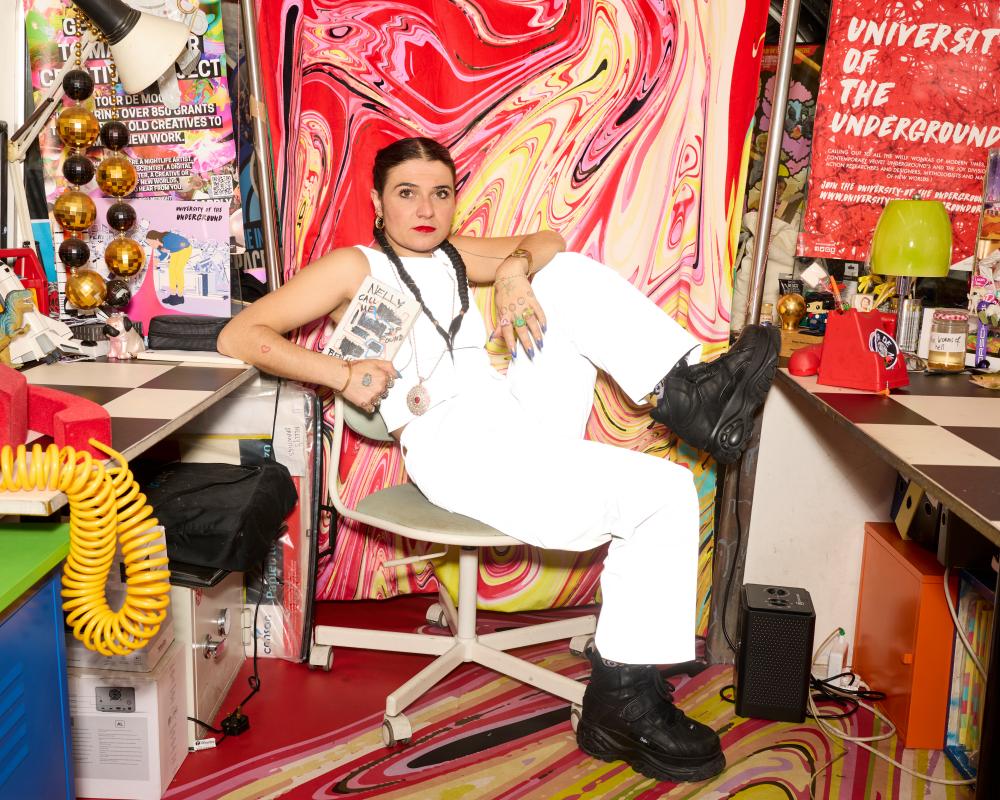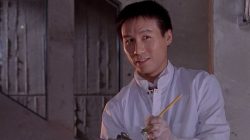
“She serves as a tremendous source of motivation for me,” explains Nelly Ben Hayoun-Stépanian, lifting an image from her exuberantly adorned workspace where she displays a picture of Marie Curie, the pioneering female laureate who was the first individual to be awarded two Nobel Prizes. “These individuals act as my muses; they’re like co-conspirators with whom I share this journey. Whenever challenges arise during a venture, I often wonder how Marie Curie might have tackled them.”
Hannah Arendt
have done?’ Hahaha.”
She chats at breakneck speed, ending her sentences with laughter as she converses with me in her office, possibly the finest one in all of London: an antique Tube carriage perched atop the rooftop of a Shoreditch club, offering panoramic views of the city below. The inside space is vibrant and eclectic—posters and fliers cover the walls, and the flooring boasts a psychedelic mix of purples and pinks. Resting on her desk is that photograph of Curie.
Tolong support kita ya,
Cukup klik ini aja: https://indonesiacrowd.com/support-bonus/
I was turned into a human Barbie doll long before the movie came out, much earlier than when Barbie became trendy.
With experience from ventures with NASA, Porsche, LEGO, and Nike,
Ben Hayoun-Stépanian functions as an artist, activist, and creative director.
All wrapped up in one. Labels aren’t really her concern; however, when pressed, she might refer to herself as an “architect of encounters.” Back in March, she set up a “stellar playland” in London’s West End district, positioning asteroid-like stones around Piccadilly Circus along with enormous glowing-in-the-dark feline inflatables (specifically Schrödinger’s cats, catering to those studying quantum mechanics). Additionally, she has transmitted heartbeats into outer space, having them ricochet off the lunar surface.
Ben Hayoun-Stépanian has a deep fascination with space and was instrumental in founding the International Space Orchestra in 2012 alongside some NASA scientists. This ensemble has had performances with renowned artists such as Sigur Rós, Beck, and Damon Albarn. Her concept mirrors her guiding principle of “disrupting hierarchical systems” and motivating individuals to view things from different perspectives. She explains, “This orchestra fosters an alternative culture within NASA; you see the agency’s chief striking the gong and astronauts taking up percussion roles. It allows them to discuss failures in the space program openly. As a result, conversations emerge questioning our objectives.”
And don’t get her started on the education system. In 2017, frustrated with the status quo, she set up the University of the Underground. It’s a non-tuition-fee-paying university run from the basements of nightclubs (past lecturers include Pussy Riot and Noam Chomsky). She has also directed five feature films – the latest, Doppelgängers³, is being shown next week as part of the London incarnation of the SXSW (South by Southwest) festival. It may be difficult to pin down exactly what she does, but she does a lot.
Films certainly hold significant importance. In Ben Hayoun-Stéphanian’s subway car, you’ll find an abundance of items from her movies and ventures. One shelf displays a massive foam strawberry, while nearby sits a comically large phone. Above the desk hangs what appears to be a Barbie figure. “That’s right!” she exclaims. “It’s actually me!” Indeed, this miniature version portrays Ben Hayoun-Stéphanian with her signature boiler suit and crimson lips. After consulting for them, toy maker Mattel crafted this particular Barbie figurine for her.
The I Can Be series of Barbies
which assigned the toys their appropriate roles. “This was
way
Before Barbie became deemed as cool,
way
Before the release of the Barbie movie, these large corporations often find it challenging to spark change from within. That’s why they bring in individuals like myself. A significant part of my job revolves around representation, ensuring various voices get heard.”
Ben Hayoun-Stépanian makes for delightful conversation. However, our focus should be on “Doppelgängers³,” an exploration into the future of outer space. Having worked in this field, she contends that humanity hasn’t absorbed historical lessons and might replicate past errors—such as Western dominance and colonization—in space too. Consider the ongoing billionaire-led space competition; Elon Musk aims to establish a human settlement on Mars, whereas Jeff Bezos envisions relocating environmentally harmful industries off-planet. “While these plans receive significant attention, I view them critically,” Ben explains. “I think they lack innovation.”
If space exploration has become exclusive to the top one percent, Doppelgängers³ envisions a different future: more inclusive and less dominated by traditional gender roles. It’s a film brimming with numerous concepts; I’m not sure where to begin, I comment. She agrees emphatically. “The movie is multifaceted. This mirrors how my mind operates. For me, separating knowledge into distinct categories simply isn’t logical. Biology cannot be separated from physics, nor from literature or culture. They all form part of an interconnected system—the universe!”
I can tell when somebody is about to ask me to leave.
She states: “To me, space isn’t a luxury. It’s not for amusement. It’s a vital experiment – the supreme challenge of what type of societies we can envision.”
Her movie is incredibly humorous, even more so than one might expect from just hearing about it. In the documentary, Ben Hayoun-Stépanian traverses various parts of the globe for insightful discussions with specialists; these include renowned astronomer Jill Tarter, a neurogeneticist, an economist, a transgender rights advocate, and a quantum physicist. The exchanges often become as unpredictable as those featured in Louis Theroux documentaries. During her meeting with political theorist Uday Singh Mehta, he playfully wraps her up in a large carpet resembling a burrito on the floor. Everything remains unscripted because “she prefers not to have predetermined notions regarding where their interactions will lead.” Moreover, she believes she knows precisely when it’s best to conclude each conversation—“When I sense that they’re ready for me to depart.”
The movie derives its title from the pair of lookalikes hired by Ben Hayoun-Stéphanian to join her on what she calls an “analog mission,” essentially a trial run mimicking space exploration right here on Earth. These doubles include Lucia, who hails from Armenia, and Myriam, originally from Algeria. Together, these three ladies journey to a cavernous site in Spain where they simulate various aspects of a space expedition. Donned in bulky spacesuits and clutching onto a safety line, they make their descent into the cave. It appears incredibly daunting. “Isn’t this amazing? Honestly, I truly believed at one point that nothing would be more perilous than doing this!”
The concept of employing lookalikes was largely driven by Ben Hayoun-Stéphanian’s intrigue into the realm of quantum physics. Additionally, she has a strong interest in intergenerational trauma—the way emotional suffering can pass down from one generation to another. Being of French-Armenian-Algerian descent, Ben Hayoun-Stéphanian comes from backgrounds marked by difficult colonial pasts. This research culminated in her producing the inaugural academic article exploring intergenerational trauma alongside visions for decolonizing future space endeavors.
Ben Hayoun-Stépanian spent her childhood in Valence, located in southeastern France. Her grandfather served as part of the committee for French Armenians who advocated for the French government’s formal acknowledgment of the Armenian genocide.
The Armenian genocide occurring between 1915 and 1916. “I was
Perhaps around 13 or 14 when she remembers [the campaign] vividly. Only in recent times did she start viewing her grandfather as an activist. This has led her to ponder whether he might have influenced her politically. During her upbringing, the family ran a textile business, which inspired her initial academic pursuit—a degree in textile design. Later, she relocated to Tokyo where she worked on kimono designs and crafted jewelry popular among Yakuza members.
In Ben Hayoun-Stéphanian’s view, space exploration challenges our understanding of every aspect. She describes it as “queer,” “decolonial,” and “pluralistic.” According to her, we must abandon traditional dichotomies and boundaries. Following the premiere of her film at Sundance last year, Donald Trump instructed NASA to terminate its diversity, equity, and inclusion programs. This decision is disheartening; viewing individuals merely as minorities misses their true worth. Incorporating varied perspectives actually enriches space missions with fresh approaches and ideas. Therefore, she argues this from a scientific standpoint.
Pussy Riot provided music for the movie, and Ben Hayoun-Stéphanian is buddies with one of the band’s founding members.
Nadya Tolokonnikova
They crossed paths when they were both speakers at a conference. “Those diplomatic guys were chasing after Nadya, you know, ‘
Oh my god
“I wanted to capture her image.” I sat beside her wearing my large black flight jacket. Everyone assumed I was her bodyguard. Nadya commands respect; for me, she embodies bravery. As for myself, I challenge authority structures. I irritate those in power. However, I stop short of facing imprisonment. I collaborate with legal experts at every step. I understand my limits and boundaries. Nadya, though, has faced incarceration. That takes things up several notches. Personally, I’d draw the line before reaching that point.”
I inquire of Ben Hayoun-Stéphanian whether she encounters pushback entering institutions like NASA with her appearance? “Absolutely!” she responds cheerfully. “There’s always that instant when I walk into the room, and folks react, ‘
What
Is this?” She’s dressed entirely in snake-print clothing today, adorned with oversized hoop earrings and bright neon-green nails. Is she at ease with confrontation? A nod. “Conflict is inevitable, but it’s also an integral part of the process. Conflict doesn’t last forever.”
I inquire if she has any other questions for me. “On May 27th, I’ll be celebrating my 40th birthday. Hehe. Mom asked me to pass this along.” Alright then. What can you say about your upcoming movie? “Hahaha! The next one is absolutely wild!”
• The screenings for Doppelgängers³ will be held on June 2nd and July 7th at Rich Mix, London, as part of SXSW.







